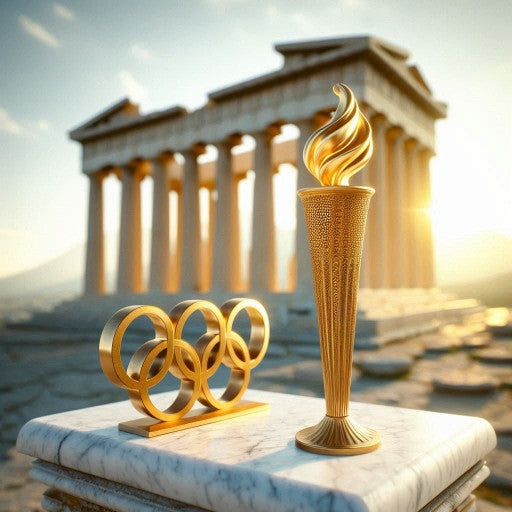The Olympic Games, both ancient and modern, stand as a testament to human athletic prowess, cultural unity, and the pursuit of excellence. However, the origins of the Olympics are deeply rooted in Greek mythology and ancient religious practices. This blog post will delve into the fascinating mythological beginnings of the Olympic Games, their evolution over time, and the impact of these ancient traditions on the modern Olympics.

Table of Contents
- Introduction
- The Mythological Beginnings of the Olympic Games
- Religious and Cultural Significance
- Ancient Olympic Events Inspired by Mythology
- The Winner's Wreath
- From Ancient Traditions to Modern Games
- Conclusion
Introduction
The Olympic Games, both ancient and modern, stand as a testament to human athletic prowess, cultural unity, and the pursuit of excellence. However, the origins of the Olympics are deeply rooted in Greek mythology and ancient religious practices. This blog post will delve into the fascinating mythological beginnings of the Olympic Games, their evolution over time, and the impact of these ancient traditions on the modern Olympics.
The Mythological Beginnings of the Olympic Games
Zeus and Olympia
According to Greek mythology, the ancient Olympic Games were held in Olympia, a sanctuary site dedicated to Zeus, the king of the Greek gods. It is believed that Zeus himself initiated athletic contests to celebrate his victory over Cronus, his father, after the Titanomachy. These games were held in his honor, making Olympia a sacred ground.
Heracles and the Twelve Labors

Another myth credits Heracles (Hercules) with founding the Olympic Games. After completing his twelve labors, Heracles established the games to honor his father, Zeus. He is also credited with marking out the length of the stadium by pacing out 600 of his own feet, which became the standard measurement for a "stadion."
Pelops and Hippodamia
The myth of Pelops and Hippodamia also ties into the origins of the Olympics. Pelops won a chariot race against King Oenomaus to marry his daughter, Hippodamia. In celebration of his victory, Pelops established the Olympic Games, adding to the rich tapestry of myths surrounding their inception.
Religious and Cultural Significance
The Sacred Truce (Ekecheiria)
During the ancient Olympic Games, a sacred truce, known as ekecheiria, was declared across Greece. This truce allowed athletes and spectators to travel safely to Olympia, highlighting the religious and unifying aspects of the games. The truce underscored the importance of peace and cooperation among the often-warring Greek city-states.
The Altis Sanctuary
The central area of Olympia, known as the Altis, was a sacred grove filled with temples, altars, and statues dedicated to various gods. The Temple of Zeus, which housed a massive statue of the god (one of the Seven Wonders of the Ancient World), was the focal point of the sanctuary. This sacred site emphasized the divine connection and religious significance of the games.
Ancient Olympic Events Inspired by Mythology
Athletic Contests
Foot Races

Foot races were among the earliest and most prestigious events in the ancient Olympics. The stadion race, a sprint covering the length of the stadium (about 192 meters), was the original Olympic event. According to myth, the hero Achilles organized foot races to honor his fallen friend Patroclus, reflecting the importance of speed and agility in heroic feats.
Wrestling

Wrestling, known as "pale," was a highly respected event in the ancient games. This sport was linked to various myths, including the story of Heracles, who was famed for his wrestling prowess. Wrestling matches tested strength, skill, and strategy, with athletes aiming to throw their opponents to the ground three times to win.
Boxing

Boxing, or "pyx," was another brutal and popular event in the ancient Olympics. It was believed to have been inspired by the god Apollo, who was often depicted in art and myth as a skilled boxer. Contestants fought without rounds until one was knocked out or conceded defeat, making it a true test of endurance and strength.
Pankration
Pankration was a no-holds-barred event that combined boxing and wrestling. It was considered one of the toughest events, and mythological heroes like Theseus and Heracles were believed to have excelled in this sport. The only rules were no biting and no gouging, making it a fierce and dangerous competition.
Pentathlon
The pentathlon was a multi-event competition consisting of five disciplines: stadion (a short foot race), discus throw, javelin throw, long jump, and wrestling. This event showcased an athlete's versatility and overall athletic ability, drawing inspiration from the well-rounded heroes of Greek mythology.
Jumping

The long jump was performed with weights called halteres, which athletes swung forward as they leapt to increase their momentum. This event was part of the pentathlon and symbolized the hero's ability to leap great distances, akin to the mythical jumps of gods and demigods.
Discus Throw

The discus throw, part of the pentathlon, was inspired by the feats of heroes such as Perseus. The discus was a heavy disc, and the event tested an athlete's strength and technique. The mythological connection to this event is seen in stories where heroes demonstrated their physical prowess by hurling heavy objects great distances.
Javelin Throw

The javelin throw tested accuracy and distance, reflecting the skills of ancient warriors and hunters. This event was also part of the pentathlon and was believed to be linked to the hero Achilles, who was renowned for his spear-throwing abilities.
Equestrian Events
Chariot Racing

Chariot racing was one of the most thrilling and dangerous events in the ancient Olympics, inspired by mythological races like that of Pelops. These races took place in the hippodrome, a large stadium designed for equestrian events. The races involved multiple laps around the track, with crashes and dramatic finishes adding to their excitement and danger.
Horse Racing
In addition to chariot racing, horse racing was a popular event. Riders competed in a race called the "keles," which involved riding bareback. This event highlighted the close relationship between horses and heroes in Greek mythology, with many myths celebrating the bond between riders and their steeds.
The Winner's Wreath

In ancient Greece, victors of the Olympic Games were awarded a laurel wreath, symbolizing honor and achievement. The laurel, or "kotinos," was an emblem of Apollo, the god of prophecy and healing, and was considered a divine token of victory. This wreath was made from branches of the sacred olive tree and was given to the champions in a ceremonial presentation.
The laurel wreath represented not only personal glory but also a connection to the divine. Winners wore these wreaths with pride, as it was believed that the gods themselves endorsed their victories. The tradition of the winner's wreath has persisted into the modern era, with the Olympic medals now symbolizing the same honor and distinction.
From Ancient Traditions to Modern Games
The Revival of the Olympic Games
The modern Olympic Games, revived in 1896 by Pierre de Coubertin, were inspired by the ancient Greek tradition. Coubertin aimed to promote international peace and unity through athletic competition, drawing on the ancient ideals of excellence and fair play.
Olympic Flame and Torch Relay
The tradition of the Olympic Flame in the modern games has its roots in ancient Greece, where a sacred fire was kept burning throughout the duration of the games as a tribute to the gods. The modern torch relay, introduced in 1936, symbolizes the continuity between the ancient and modern games.
Olympic Ideals and Values
The modern Olympic Games aim to embody ideals central to the ancient games, such as excellence, friendship, and respect. These values, rooted in the Greek concept of "arete" (virtue or excellence), continue to inspire athletes and spectators alike.
Conclusion
The Olympic Games, from their mythological origins to their modern revival, are a celebration of human athleticism, cultural unity, and the timeless pursuit of excellence. Rooted in the rich traditions of ancient Greece, the Olympics continue to inspire and bring together people from around the world, bridging the gap between past and present.
Interested in Greek mythology ? Visit our blog here

